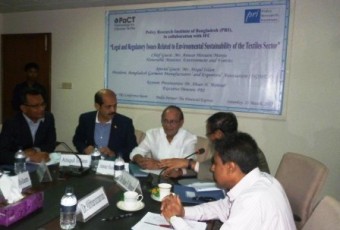At a seminar organised recently in Dhaka, experts recommended framing rules for making the Bangladesh textile industry environmental complaint due to the rise in demand for green products.

The seminar titled ‘Legal and Regulatory Issues Related to Environmental Sustainability of the Textiles Sector’ was organised jointly by Policy Research Institute (PRI) and International Finance Corporation (IFC).
The experts also recommended giving financial or fiscal incentives to encourage the industry to adopt low-cost clean production practices.
They also suggested creating an awareness campaign among industry entrepreneurs that reduction of energy consumption can also lead to reducing costs.
BGMEA President Atiqul Islam said ensuring environmental parameters and quality have now become basic requirements for factories and missing any one of the two can mean being out of business fast.
He was of the opinion that it is easy for big factories to address environmental pollution issues, but not for smaller factories, which is a big challenge.
He recommended that the government extend financial support at lower interest rates for implementing environmental issues in the garment industry.
According to the minister of environment and forests, Anwar Hossain Manju, his ministry had put in best efforts to improve the environment in Bangladesh.
He said that there are a lot of regulations in place, but the need of the hour was effective implementation of these regulations to reduce pollution.
Tanuja Bhattacharjee, environmental adviser said proper guidelines are necessary as environmental issues are becoming increasingly important in the international arena.
She added that it was necessary to look at the issues seriously to set an example before the world and also informed that they are launching a mobile testing water wastage program to identify level of environment pollution.
Kawser Ali, COO at Comfit Composite explained as to how his company by using environment-friendly technology, was able to cut water usage from 180 litres to 50 litres for washing a kilogram of fabric.
Ahsan Mansur, ED at PRI presented a set of recommendations, including differentiating water tariffs based on locations, strengthening enforcement and monitoring and tax and duty rationalization.
These measures according to Mansur were important for encouraging production of environmentally-friendly products and for discouraging hazardous chemicals.
Mansur said although statistics related to installation of effluent treatment plants (ETPs) in dyeing and printing units was not available, the perception is that the coverage is very low at around 30 per cent.
He concluded by saying that without full coverage with ETPs and strict enforcement of rules, the challenge of water pollution could not be addressed.





